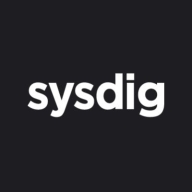

Cloudflare and Sysdig Secure compete in the realm of security and web optimization services. Cloudflare appears to have the upper hand in web performance and a cost-effective approach, while Sysdig Secure provides a more comprehensive security framework for cloud-native environments.
Features: Cloudflare stands out with CDN caching, DDoS protection, and flexible SSL. These features enhance security and improve loading times. Sysdig Secure is noted for its runtime security, Falco open-source tool, and integration with major cloud providers. It focuses on providing thorough security solutions tailored for DevSecOps.
Room for Improvement: Cloudflare needs better analytics, improved CDN speed enhancements, and support for Always Online features. Sysdig Secure should focus on refining its dashboard, reporting capabilities, and scalability, particularly with database monitoring and expanding support in the Asia Pacific region.
Ease of Deployment and Customer Service: Cloudflare is known for its easy deployment, especially in public cloud environments, although response times for free-tier users could be better. Sysdig Secure, while often deployed on-premises, receives positive feedback for its support, despite calls for more detailed issue resolution.
Pricing and ROI: Cloudflare provides a flexible free tier and scalable pricing plans, making it accessible for small to large businesses. Sysdig Secure incurs higher costs due to advanced features but justifies this with a focus on robust security and integration. Cloudflare is appreciated for low-cost essential features, whereas Sysdig Secure’s higher investment is reflected in its comprehensive security focus.


Cloudflare is a highly-regarded Content Delivery Network (CDN) and a Distributed Denial-of-Service (DDoS) protection solution. The robust global connectivity cloud platform that is Cloudflare ensures users are able to connect to the Internet quickly, securely, and reliably. Cloudflare is one of the world's largest networks in the marketplace today. Using Cloudflare, businesses, educational entities, NGOs, vloggers, bloggers, and anyone else with an internet presence can experience more secure, faster websites and applications.
Currently, there are millions of Internet locations on Cloudflare, and the Cloudflare network
continues to grow every day by the thousands. The solution is able to fulfill the requests for
millions of websites seamlessly and serves on average 45 million HTTP requests per second.
Cloudflare has safe, secure data centers in close to 300 cities worldwide to ensure every
client request is filled as quickly as possible. It is Cloudflare’s edge network that makes this
possible by keeping content and other services as close to each client as possible, so the
information requests are always only seconds away.
Many organizations that work in democracy, civil society, human rights, or the arts are able to
access Cloudflare's highest levels of protection for free via Project Galileo. Additionally, official
election websites can be secured from hacking and fraud through Cloudflare’s Project
Athenian, also at no additional cost.
Cloudflare can also help organizations of all sizes develop a robust zero-trust strategy to
ensure the highest levels of productivity and profitability. Employees, stakeholders, and end users have a greater level of satisfaction and overall improved user experience, which can, in
turn, result in higher revenues and overall ROI. Zero-trust and BYOD (bring your own device)
access ensure end users and employees always have the best resources and technology
available to them at all times.
Cloudflare benefits
Cloudflare has many benefits. Some of its most valuable benefits include:
- Faster load times
- Robust DNS security
- Intuitive cloud Web Application Firewall (WAF)
- Free universal SSL
- Image enhancement
- Automatic browser caching
- Next-generation cloud load balancer
- Accelerated Mobile Pages (AMP)
- Rate limiting
- Minification
- Zero-trust capabilities
- Cost-effective
- Reduced carbon footprint
Reviews from real users
“Many websites require an SSL certificate because they sell stuff and want SSL. Cloudflare
comes with an SSL certificate built in. It's automatic. You sign yourself up for Cloudflare, and
an SSL certificate automatically protects your website. If you have a connection between your
website and your host, the server, Cloudflare, and the host, you don't necessarily need a
certificate.” Spencer M., Owner at Tech Exchange
“What I like best about Cloudflare is that my company can use it to trace and manage
applications and monitor traffic. The solution tells you if there's a spike in traffic. Cloudflare
also sends you a link to check your equipment and deployment and track it through peering,
so it's a valuable tool.” Daniel P., Network Engineer at Ufinet
“The most valuable feature of Cloudflare is the GUI. You are able to control the solution very
well through the interface. There is a lot of functionality that is embedded in the service.” PeerSpot user, Competence Center Manager at a tech services company
In the cloud, every second counts. Attacks move at warp speed, and security teams must protect the business without slowing it down. Sysdig stops cloud attacks in real time, instantly detecting changes in risk with runtime insights, a unique AI architecture, and open source Falco. Sysdig delivers live visibility by correlating signals across cloud workloads, identities, and services to uncover hidden attack paths. By knowing what is running, teams can prioritize the vulnerabilities, misconfigurations, permissions, and threats that matter most. From prevention to defense, Sysdig helps enterprises move faster and focus on what matters: innovation.
Sysdig. Secure Every Second.
We monitor all Cloud Security Posture Management (CSPM) reviews to prevent fraudulent reviews and keep review quality high. We do not post reviews by company employees or direct competitors. We validate each review for authenticity via cross-reference with LinkedIn, and personal follow-up with the reviewer when necessary.